新概念英语第二册Lesson64The Channel Tunnel(共37张PPT)
文档属性
| 名称 | 新概念英语第二册Lesson64The Channel Tunnel(共37张PPT) |  | |
| 格式 | ppt | ||
| 文件大小 | 470.0KB | ||
| 资源类型 | 教案 | ||
| 版本资源 | 新概念英语 | ||
| 科目 | 英语 | ||
| 更新时间 | 2023-10-06 19:40:37 | ||
图片预览

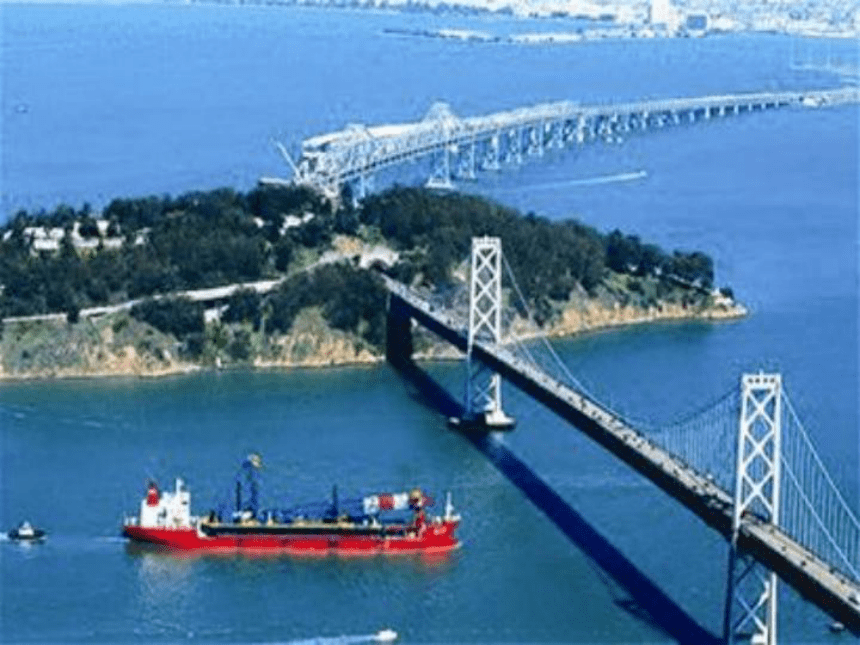
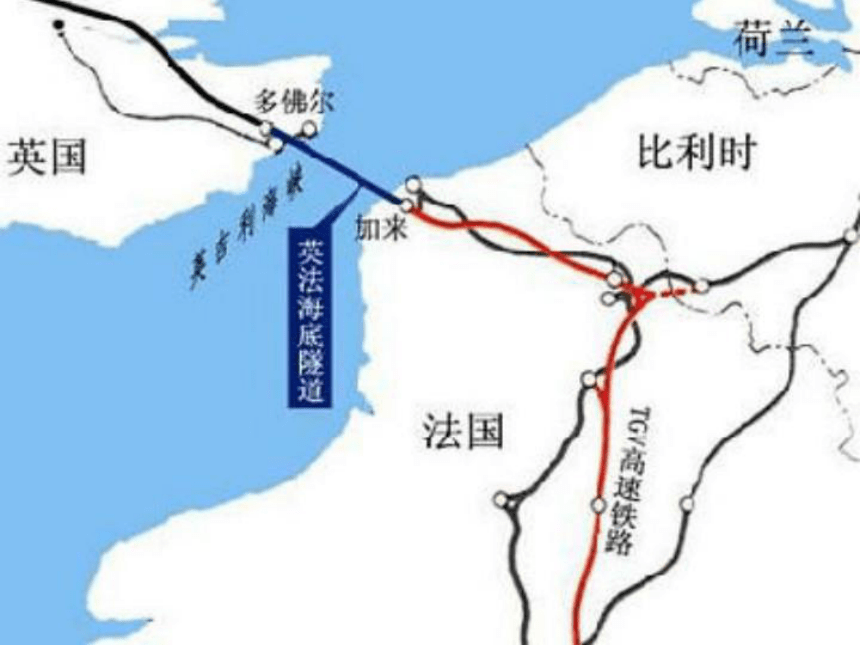
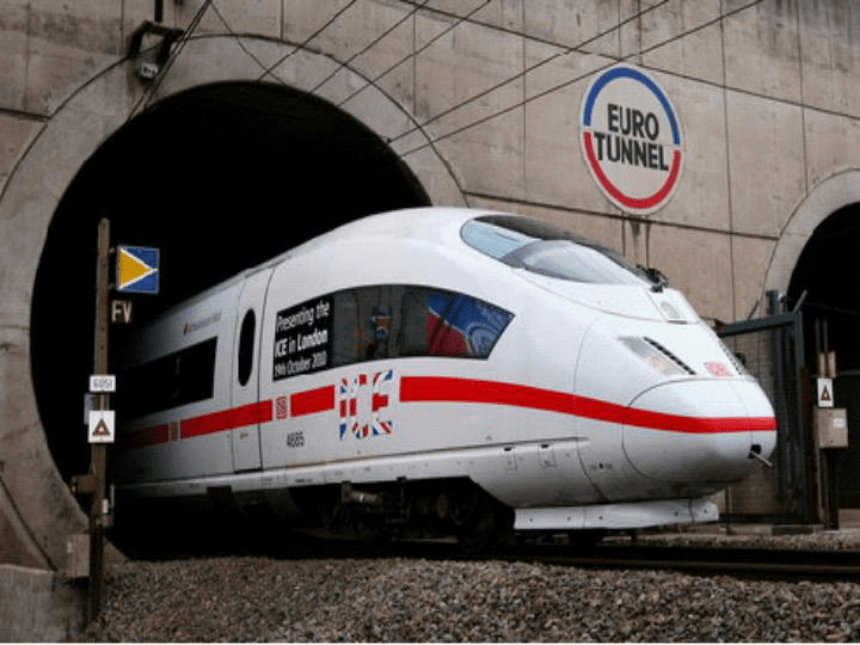
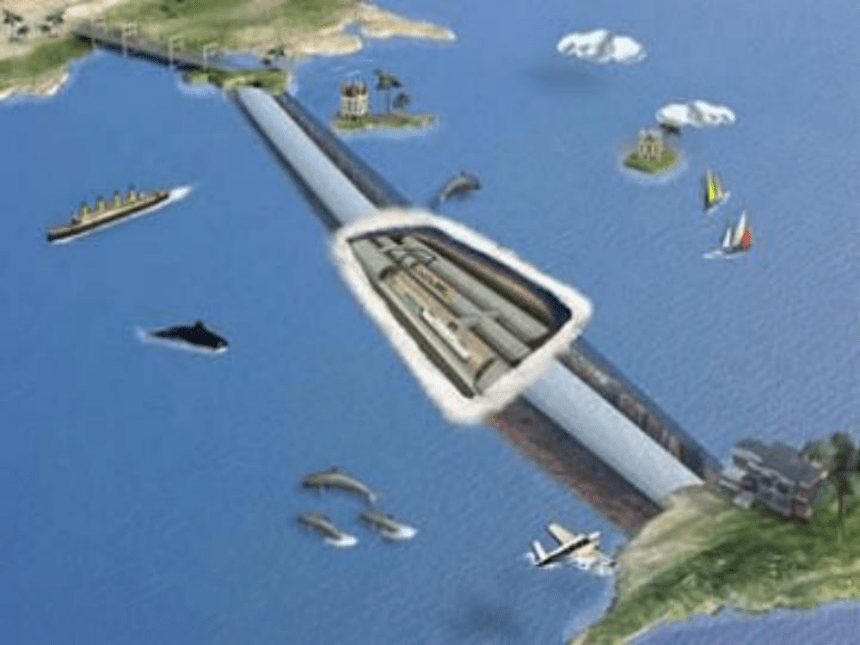
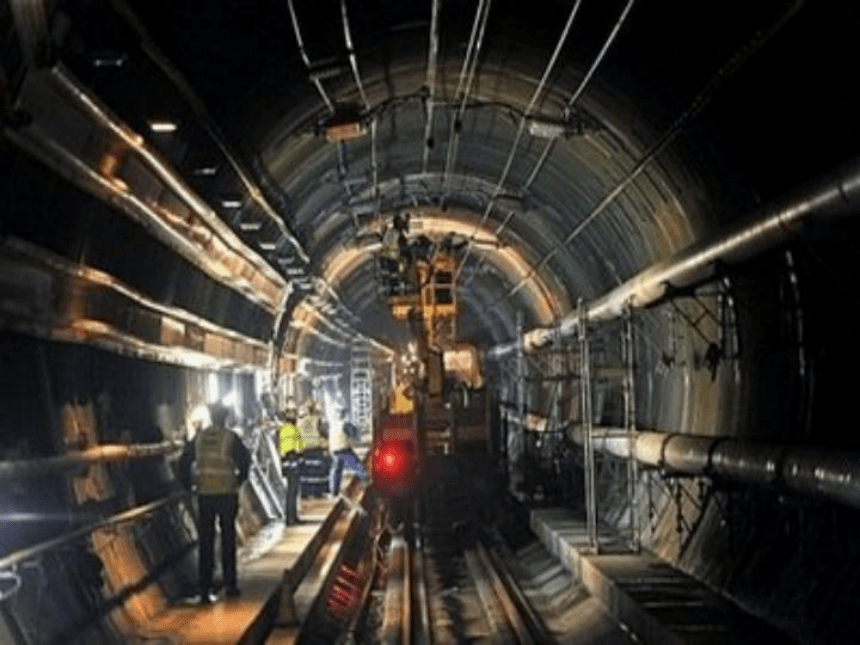
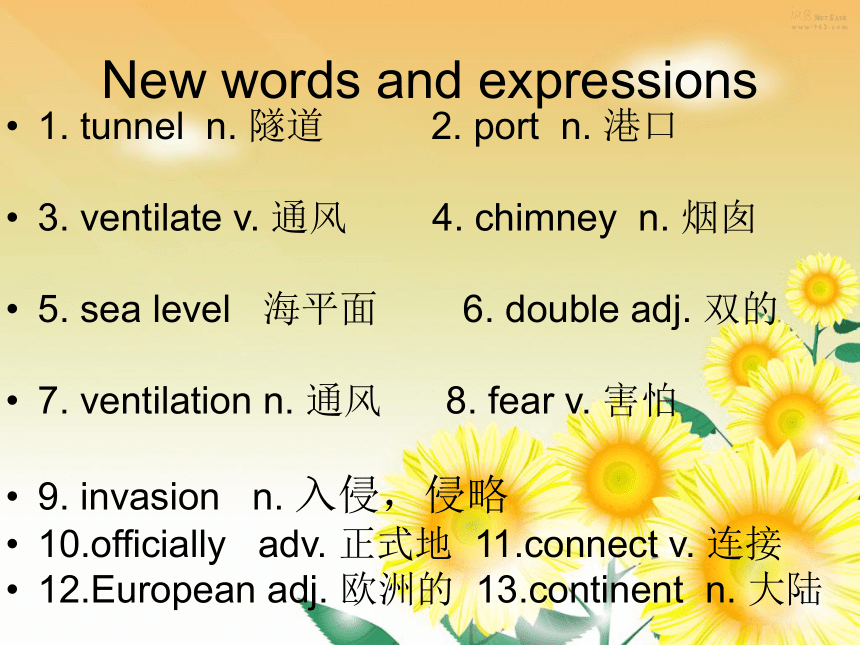
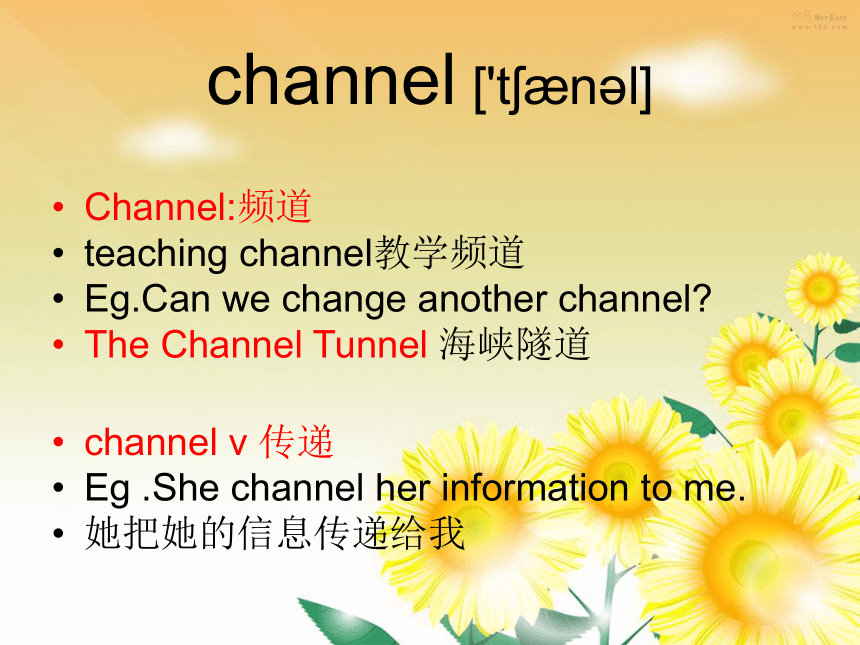
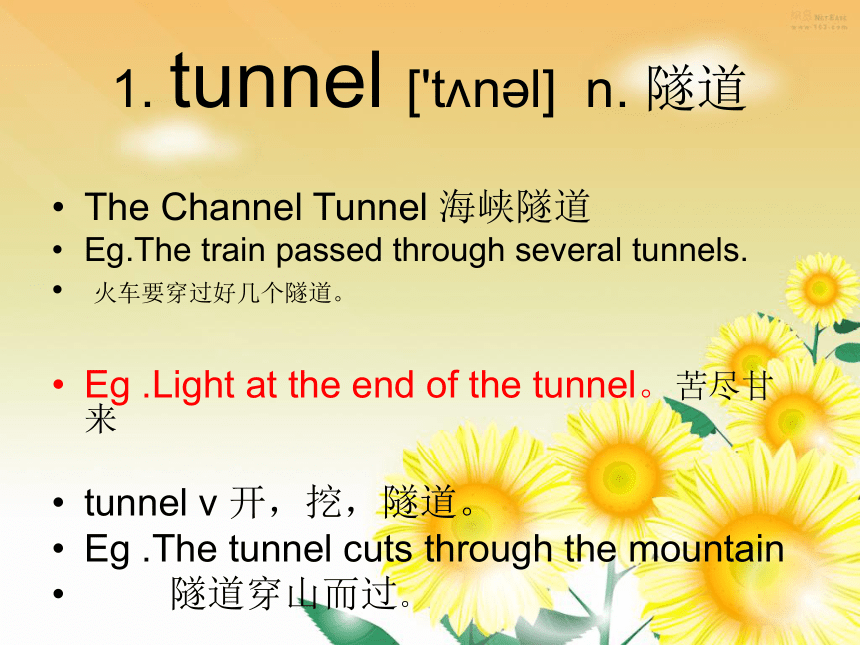
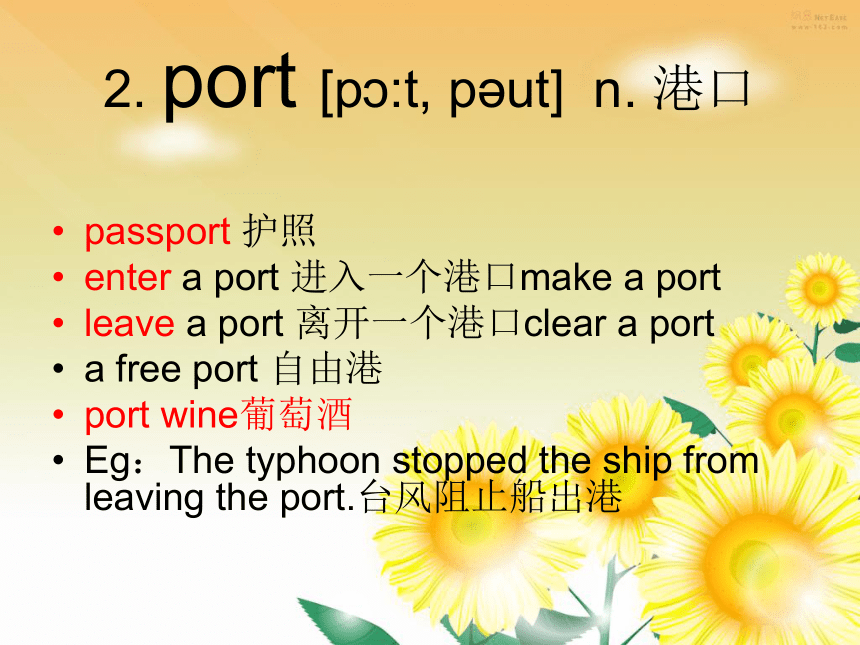
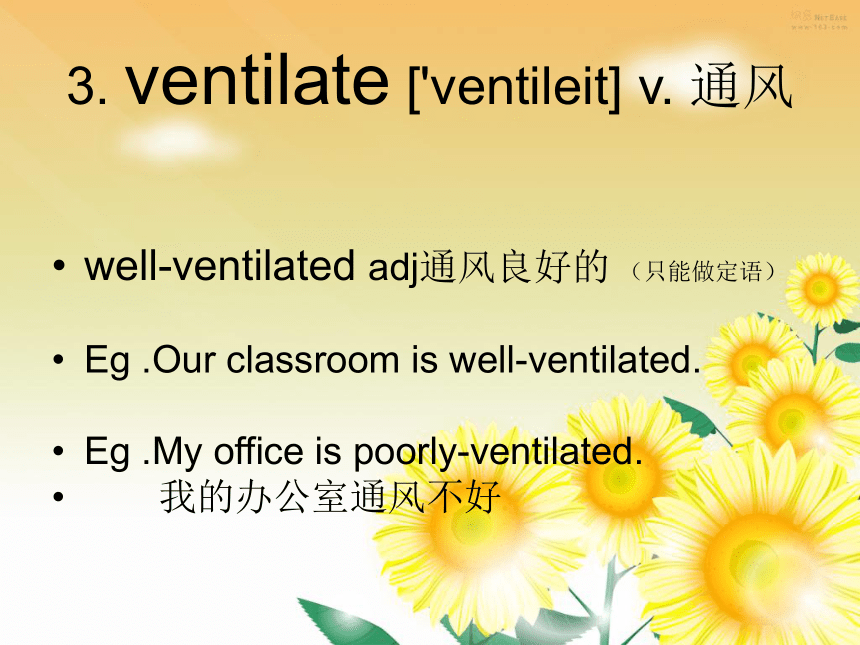
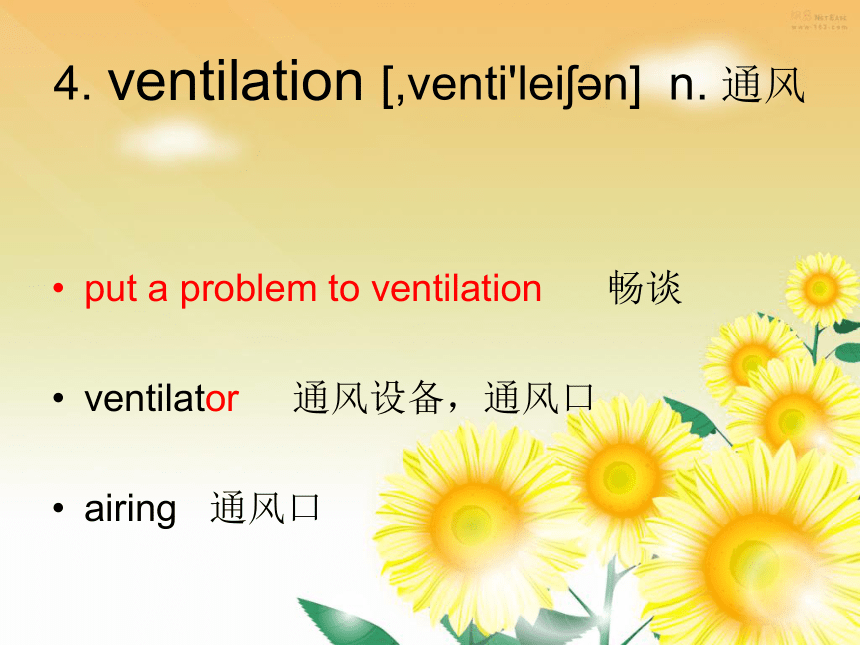
文档简介
(共37张PPT)
Lesson 64
The Channel Tunnel
New words and expressions
1. tunnel n. 隧道 2. port n. 港口
3. ventilate v. 通风 4. chimney n. 烟囱
5. sea level 海平面 6. double adj. 双的
7. ventilation n. 通风 8. fear v. 害怕
9. invasion n. 入侵,侵略
10.officially adv. 正式地 11.connect v. 连接
12.European adj. 欧洲的 13.continent n. 大陆
channel ['t n l]
Channel:频道
teaching channel教学频道
Eg.Can we change another channel
The Channel Tunnel 海峡隧道
channel v 传递
Eg .She channel her information to me.
她把她的信息传递给我
1. tunnel ['t n l] n. 隧道
The Channel Tunnel 海峡隧道
Eg.The train passed through several tunnels.
火车要穿过好几个隧道。
Eg .Light at the end of the tunnel。苦尽甘来
tunnel v 开,挖,隧道。
Eg .The tunnel cuts through the mountain
隧道穿山而过。
2. port [p :t, p ut] n. 港口
passport 护照
enter a port 进入一个港口make a port
leave a port 离开一个港口clear a port
a free port 自由港
port wine葡萄酒
Eg:The typhoon stopped the ship from leaving the port.台风阻止船出港
3. ventilate ['ventileit] v. 通风
well-ventilated adj通风良好的 (只能做定语)
Eg .Our classroom is well-ventilated.
Eg .My office is poorly-ventilated.
我的办公室通风不好
4. ventilation [,venti'lei n] n. 通风
put a problem to ventilation 畅谈
ventilator 通风设备,通风口
airing 通风口
5. chimney ['t imni] n. 烟囱
sweep a chimney
=clean a chimney清扫烟囱
factory chimney/chimneys工厂的烟囱
Eg .It is said that Father Christmas gives the children present through the chimney.
=It is said that Father Christmas comes down chimney to bring presents.
6. sea level ['lev l] 海平面
sea 大海 level 水平,海拔。
level
1)n.水平、高度= altitude
one thousand metres above sealevel海拔1000米
2)n,高度,等级 the level of the water水位
3)adj平的 the road is level.路是平的
4)adj 相同程度的;势均力敌的
a level race 一场势均力敌的比赛
do one's level best
=try one's best =do one's possible尽最大的努力
7.double ['d bl] adj. 双的 single
double chin 双下巴
double standard 双重标准
double talk 含糊其辞的话
double check 仔细检查
8. fear [fi ] v. 害怕 =terror
1)n.害怕 a fear of heights恐高症
Eg .The soldier didn't show his fear. 这个士兵没有显示出畏惧的神色。
have a great fear of sth极度害怕某物
Eg .She has a great fear of fire.他很怕火。
2)v. 害怕……=be afraid of
Eg .He fears death. 他怕死
never fear! 别担心=don’t worry
fear doing
Eg .He feared staying alone in the dark.他害怕一个人呆在黑暗处。
fear to do sth 害怕做某事
Eg .she feared to speak in the public.他害怕在公共场合说话。
10. officially [ 'fi li] adv. 正式地
office n. 办公室
officer 军官
official adj. 官方的
an official decision官方的决定
government officials 政府官员
officially adv
announce officially 正式地公告
11. connect [k 'nekt] v. 连接
Eg .Please contact me with New York. 请给我接纽约。
connect with 并列的连接
eg :Connect this computer with that computer
把这台电脑和那台电脑连接起来。
connect to 连接向……
eg :He connected a mouse to the computer.
他把鼠标连到电脑上。
12. European [,ju r 'pi: n] adj. 欧洲的13. continent ['k ntin nt] n. 大陆
the Continents: (大陆)
Asia亚洲
Europe ['ju r p] 欧洲
North Africa 北非
South Africa南非
North America 北美洲
South America 南美洲
Oceania大洋洲
Qs of the text
1.When did Aime Thome de Gamond arrive in England
(In 1858.)
2.Was he an engineer or an astronaut
(He was an engineer.)
3.What nationality was he
(French.)
4.What did he have a plan for
(For a 21-mile tunnel under the English Channel.)
5.What did he say it would be possible to build in the center of the Channel
(A platform.)
6.What would this platform serve as
(A port and a railway station.)
7.How would the tunnel be ventilated
(Tall chimneys would be built above sea level.)
8.Who put forward a better plan
(William Low did.)
9.He wasn’t French, was he
(No, he wasn’t.)
10.What did he suggest should be built
(A double railway-tunnel.)
11.When was a tunnel actually begun
(In 1902.)
1. In 1858, a French engineer, Aimé Thomé de Gamond, arrived in England with a plan for a twenty-one-mile tunnel under the English Channel. 1858年,一位名叫埃梅·托梅·德·干蒙的法国工程师带着建造一条长21英里、穿越英吉利海峡的隧道计划到了英国。
1.Aime Thome de Gamond作a French engineer 的同位语
2.twenty-one-mile
adj.作tunnel的修饰语(定语),mile为单数
3.plan for +n./v-ing.表示“.....的计划”
eg:They always make plans for their holidays........
plan to do sth 计划做某事
2. He said that it would be possible to build a platform in the centre of the Channel. 他说,可以在隧道中央建造一座平台。
1)that ........宾语从句
2)it 作形式主语,to do 不定式作真正主语
3)in the centre只能指空间上的中间
4)platform 平台、站台、月台
3. This platform would serve as a port and
a railway station.
这座平台将用作码头和火车站。
serve as= serve for..起..作用,担任,充当
eg : The books on the floor may serve as /for carpet.
serve sb with 用......招待
eg :Jim served me with wine.Jim用酒招待我。
4. The tunnel would be well-ventilated if tall chimneys were built above sea level.
如果再建些伸出海面的高大的烟囱状通风管,隧道就具备了良好的通风条件。
If 引导的非真实条件句, 对现在的假设。
主句 would be 从句 were built
5. In 1860, a better plan was put forward by an Englishman, William Low.
1860年,一位名叫威廉·洛的英国人提出了一项更好的计划。
put forward =put up 建立
eg:They have put forward their date of wedding.
backward adv. 向后
forward 前进
backward and forward 来回走
from this time forward从此以后
6. He suggested that a double railway tunnel should be built.
他提议建一条双轨隧道
虚拟语气
在英文中,动词suggest,demand,recommend等后面所接的that宾语从句中,
谓语动词用“should+动词原形”,should可省略。
eg:He suggested that they (should)change the plans.
7. This would solve the problem of ventilation, for if a train entered this tunnel, it would draw in fresh air behind it.
这样就解决了通风问题, 因为如果有一列火车开进隧道,它就把新鲜空气随之抽进了隧道。
1)solve the problem 解决问题
2)draw in ( = take in ) 吸入、吸进
3)if 非真实条件句,对现在事情的假设
8. Forty-two years later a tunnel was actually begun.
42年以后,隧道实际已经开始建了。
was actually begun.被动语态
9. If, at the time, the British had not feared invasion, it would have been completed.
如果不是因为那时英国人害怕入侵,隧道早就建成了。
If引导的非真实的条件句, 对过去的假设。
对大战期间所发生的事情的一种假设,而这种假设与事实不符。
主句would + have +过去分词
从句had +done(过去完成时)
10. The world had to wait almost another 100 years for the Channel Tunnel.
世界不得不再等将近100年才看到海峡隧道竣工。
11. It was officially opened on March 7,1994,finally connecting Britain to the European continent.
它于1994年3月7日正式开通,将英国与欧洲大陆连到了一起。
Phrase
in the center of serve as at the time put forward solve a problem
Grammar in use
语气:
陈述语气,祈使语气和虚拟语气。
1:陈述语气:用来表示所说的话是事实或者提出疑问,广泛用于陈述句,疑问句和感叹句。
2:祈使语气:表示所说的话是请求,命令,指示或者劝告。
虚拟语气
虚拟语气:1.表示所说的话不是事实,而是一种假设,猜测,怀疑等。(在条件从句或者让步状语从句中)
2:一种表示说话人的愿望,要求,命令,建议等(在宾语从句,表语从句,同位语从句)
虚拟语气在条件状语从句中的用法
真实条件句所表的假设是可能发生和实现的,是与实施相符的。
E.g. if it is fine tomorrow, I will go to visit my grandpa.
非真实条件句所表达的假设则不可能或不大可能发生或实现的,与事实相反的情况。
If I were a bird, I would fly to America.
非真实条件句
1 .对现在相反的假设
主句:would+do 从句:一般过去时 were
If you went to the exhibition .you would enjoy it.
如果你去那个展览,你会喜欢它的。
I would act differently if I were in your position
如果我出于你的那个位置,我会做得和你不一样。
2.对过去相反的假设
主句:would have done 从句:had done
If you had not hurried, you would have missed the train.
如果你当初不快的话,你就会错过火车。
Lesson 64
The Channel Tunnel
New words and expressions
1. tunnel n. 隧道 2. port n. 港口
3. ventilate v. 通风 4. chimney n. 烟囱
5. sea level 海平面 6. double adj. 双的
7. ventilation n. 通风 8. fear v. 害怕
9. invasion n. 入侵,侵略
10.officially adv. 正式地 11.connect v. 连接
12.European adj. 欧洲的 13.continent n. 大陆
channel ['t n l]
Channel:频道
teaching channel教学频道
Eg.Can we change another channel
The Channel Tunnel 海峡隧道
channel v 传递
Eg .She channel her information to me.
她把她的信息传递给我
1. tunnel ['t n l] n. 隧道
The Channel Tunnel 海峡隧道
Eg.The train passed through several tunnels.
火车要穿过好几个隧道。
Eg .Light at the end of the tunnel。苦尽甘来
tunnel v 开,挖,隧道。
Eg .The tunnel cuts through the mountain
隧道穿山而过。
2. port [p :t, p ut] n. 港口
passport 护照
enter a port 进入一个港口make a port
leave a port 离开一个港口clear a port
a free port 自由港
port wine葡萄酒
Eg:The typhoon stopped the ship from leaving the port.台风阻止船出港
3. ventilate ['ventileit] v. 通风
well-ventilated adj通风良好的 (只能做定语)
Eg .Our classroom is well-ventilated.
Eg .My office is poorly-ventilated.
我的办公室通风不好
4. ventilation [,venti'lei n] n. 通风
put a problem to ventilation 畅谈
ventilator 通风设备,通风口
airing 通风口
5. chimney ['t imni] n. 烟囱
sweep a chimney
=clean a chimney清扫烟囱
factory chimney/chimneys工厂的烟囱
Eg .It is said that Father Christmas gives the children present through the chimney.
=It is said that Father Christmas comes down chimney to bring presents.
6. sea level ['lev l] 海平面
sea 大海 level 水平,海拔。
level
1)n.水平、高度= altitude
one thousand metres above sealevel海拔1000米
2)n,高度,等级 the level of the water水位
3)adj平的 the road is level.路是平的
4)adj 相同程度的;势均力敌的
a level race 一场势均力敌的比赛
do one's level best
=try one's best =do one's possible尽最大的努力
7.double ['d bl] adj. 双的 single
double chin 双下巴
double standard 双重标准
double talk 含糊其辞的话
double check 仔细检查
8. fear [fi ] v. 害怕 =terror
1)n.害怕 a fear of heights恐高症
Eg .The soldier didn't show his fear. 这个士兵没有显示出畏惧的神色。
have a great fear of sth极度害怕某物
Eg .She has a great fear of fire.他很怕火。
2)v. 害怕……=be afraid of
Eg .He fears death. 他怕死
never fear! 别担心=don’t worry
fear doing
Eg .He feared staying alone in the dark.他害怕一个人呆在黑暗处。
fear to do sth 害怕做某事
Eg .she feared to speak in the public.他害怕在公共场合说话。
10. officially [ 'fi li] adv. 正式地
office n. 办公室
officer 军官
official adj. 官方的
an official decision官方的决定
government officials 政府官员
officially adv
announce officially 正式地公告
11. connect [k 'nekt] v. 连接
Eg .Please contact me with New York. 请给我接纽约。
connect with 并列的连接
eg :Connect this computer with that computer
把这台电脑和那台电脑连接起来。
connect to 连接向……
eg :He connected a mouse to the computer.
他把鼠标连到电脑上。
12. European [,ju r 'pi: n] adj. 欧洲的13. continent ['k ntin nt] n. 大陆
the Continents: (大陆)
Asia亚洲
Europe ['ju r p] 欧洲
North Africa 北非
South Africa南非
North America 北美洲
South America 南美洲
Oceania大洋洲
Qs of the text
1.When did Aime Thome de Gamond arrive in England
(In 1858.)
2.Was he an engineer or an astronaut
(He was an engineer.)
3.What nationality was he
(French.)
4.What did he have a plan for
(For a 21-mile tunnel under the English Channel.)
5.What did he say it would be possible to build in the center of the Channel
(A platform.)
6.What would this platform serve as
(A port and a railway station.)
7.How would the tunnel be ventilated
(Tall chimneys would be built above sea level.)
8.Who put forward a better plan
(William Low did.)
9.He wasn’t French, was he
(No, he wasn’t.)
10.What did he suggest should be built
(A double railway-tunnel.)
11.When was a tunnel actually begun
(In 1902.)
1. In 1858, a French engineer, Aimé Thomé de Gamond, arrived in England with a plan for a twenty-one-mile tunnel under the English Channel. 1858年,一位名叫埃梅·托梅·德·干蒙的法国工程师带着建造一条长21英里、穿越英吉利海峡的隧道计划到了英国。
1.Aime Thome de Gamond作a French engineer 的同位语
2.twenty-one-mile
adj.作tunnel的修饰语(定语),mile为单数
3.plan for +n./v-ing.表示“.....的计划”
eg:They always make plans for their holidays........
plan to do sth 计划做某事
2. He said that it would be possible to build a platform in the centre of the Channel. 他说,可以在隧道中央建造一座平台。
1)that ........宾语从句
2)it 作形式主语,to do 不定式作真正主语
3)in the centre只能指空间上的中间
4)platform 平台、站台、月台
3. This platform would serve as a port and
a railway station.
这座平台将用作码头和火车站。
serve as= serve for..起..作用,担任,充当
eg : The books on the floor may serve as /for carpet.
serve sb with 用......招待
eg :Jim served me with wine.Jim用酒招待我。
4. The tunnel would be well-ventilated if tall chimneys were built above sea level.
如果再建些伸出海面的高大的烟囱状通风管,隧道就具备了良好的通风条件。
If 引导的非真实条件句, 对现在的假设。
主句 would be 从句 were built
5. In 1860, a better plan was put forward by an Englishman, William Low.
1860年,一位名叫威廉·洛的英国人提出了一项更好的计划。
put forward =put up 建立
eg:They have put forward their date of wedding.
backward adv. 向后
forward 前进
backward and forward 来回走
from this time forward从此以后
6. He suggested that a double railway tunnel should be built.
他提议建一条双轨隧道
虚拟语气
在英文中,动词suggest,demand,recommend等后面所接的that宾语从句中,
谓语动词用“should+动词原形”,should可省略。
eg:He suggested that they (should)change the plans.
7. This would solve the problem of ventilation, for if a train entered this tunnel, it would draw in fresh air behind it.
这样就解决了通风问题, 因为如果有一列火车开进隧道,它就把新鲜空气随之抽进了隧道。
1)solve the problem 解决问题
2)draw in ( = take in ) 吸入、吸进
3)if 非真实条件句,对现在事情的假设
8. Forty-two years later a tunnel was actually begun.
42年以后,隧道实际已经开始建了。
was actually begun.被动语态
9. If, at the time, the British had not feared invasion, it would have been completed.
如果不是因为那时英国人害怕入侵,隧道早就建成了。
If引导的非真实的条件句, 对过去的假设。
对大战期间所发生的事情的一种假设,而这种假设与事实不符。
主句would + have +过去分词
从句had +done(过去完成时)
10. The world had to wait almost another 100 years for the Channel Tunnel.
世界不得不再等将近100年才看到海峡隧道竣工。
11. It was officially opened on March 7,1994,finally connecting Britain to the European continent.
它于1994年3月7日正式开通,将英国与欧洲大陆连到了一起。
Phrase
in the center of serve as at the time put forward solve a problem
Grammar in use
语气:
陈述语气,祈使语气和虚拟语气。
1:陈述语气:用来表示所说的话是事实或者提出疑问,广泛用于陈述句,疑问句和感叹句。
2:祈使语气:表示所说的话是请求,命令,指示或者劝告。
虚拟语气
虚拟语气:1.表示所说的话不是事实,而是一种假设,猜测,怀疑等。(在条件从句或者让步状语从句中)
2:一种表示说话人的愿望,要求,命令,建议等(在宾语从句,表语从句,同位语从句)
虚拟语气在条件状语从句中的用法
真实条件句所表的假设是可能发生和实现的,是与实施相符的。
E.g. if it is fine tomorrow, I will go to visit my grandpa.
非真实条件句所表达的假设则不可能或不大可能发生或实现的,与事实相反的情况。
If I were a bird, I would fly to America.
非真实条件句
1 .对现在相反的假设
主句:would+do 从句:一般过去时 were
If you went to the exhibition .you would enjoy it.
如果你去那个展览,你会喜欢它的。
I would act differently if I were in your position
如果我出于你的那个位置,我会做得和你不一样。
2.对过去相反的假设
主句:would have done 从句:had done
If you had not hurried, you would have missed the train.
如果你当初不快的话,你就会错过火车。
同课章节目录
